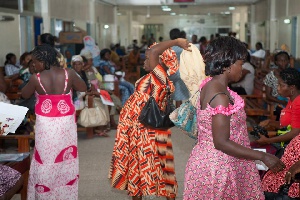General News of Monday, 10 February 2003
Source: Public Agenda
Korle-Bu nurses use lantern
Korle Bu Teaching Hospital’s maternity unit is still without electricity, one week after it was plunged into darkness, forcing staff to use lantern for their work.
While straightforward deliveries continued as normal, women who suffered complications and had to have a caesarean section were taken to La Polyclinic to be operated on. However, Korle Bu staff had to travel with their patients to the polyclinic to operate on them as the polyclinic staff are already struggling to deal with their own patients.
“Staff are still coming to work as normal but one nurse is doing the work of four nurses and staff are forced to work long hours. The lack of electricity has made this much harder but we can’t turn away patients, they are still coming,” Prof E. Kwawukume, Head of Obstretics and Gynaecology at Korle Bu told Public Agenda.
The obstretics and gyabaecology department can see up to 300 women pass through its doors each day for treatment and delivers an average of 40 babies per day. Staff are already over-stretched and under-resourced and the lack of electricity has exacerbated already existing problems.
The maternity wing and the children’s department were left without electricity and staff had to rally round to carry on treating patients when the transformer got burnt on Friday 31 January.”
With no back up generator, working without electricity at night was near impossible and staff were forced to work by the light of lantern. “We are coping with the patients but it would be nice if facilities were improved. This is a big, very old department. If it had been better maintained, this wouldn’t have happened,” Prof Kwawukume said.
There is a backlog of paperwork because none of the computers is working so staff have been forced to sit outside for a source of light and fill in the patients’ reports by hand which is tedious and time-consuming. Partial light has been restored but it is still not enough to run the wing efficiently. The dim waiting room was full of patients waiting to be seen at the department, when Public Agenda visited the unit.
Facilities at the teaching hospital need to be greatly improved according to the professor. The buildings are in disrepair and even though a new wing is being built, it cannot come soon enough. Prof Kwawukume admitted that even though the gynaecological operating theatre is clean and safe, it could be in a better condition.
The hospital perform 10-15 gynaecological operations a day so they need facilities that can let them do their job efficiently. Some new equipment has been ordered but that alone will not solved the problems the teaching hospital is experiencing.
Teaching hospitals are funded by the government, so are excluded from the Ghana Health Service. This means that the cash and carry system is still in place. This cause problems for disadvantaged patients who use the hospital, making it more difficult for poorer women to find their treatment and medication.
Prof Kwawukume and his team hope to launch the Women’s Foundation next month, which will be aimed at helping poor women by subsidising the cost of treatment and drugs and offering financial support.











